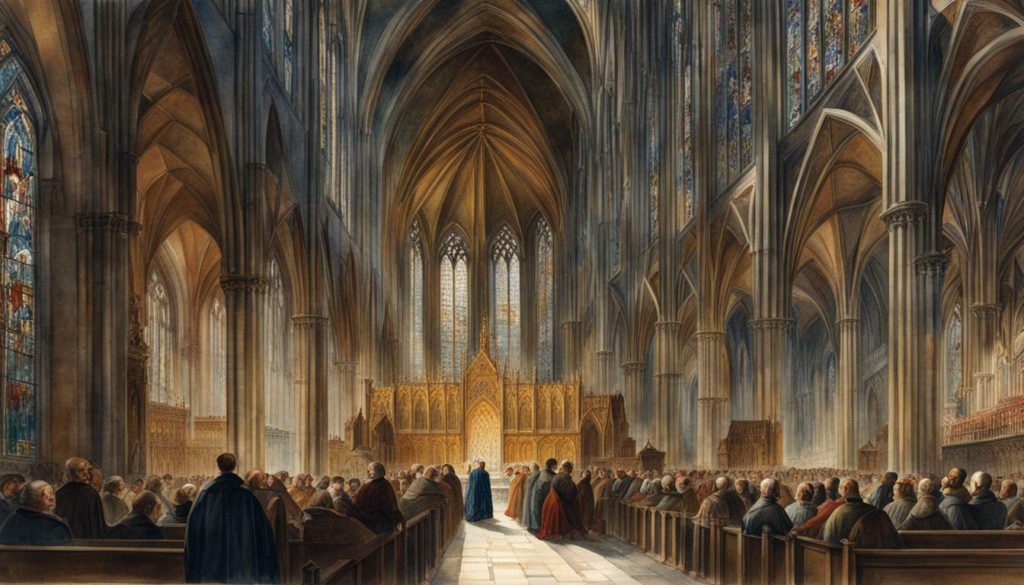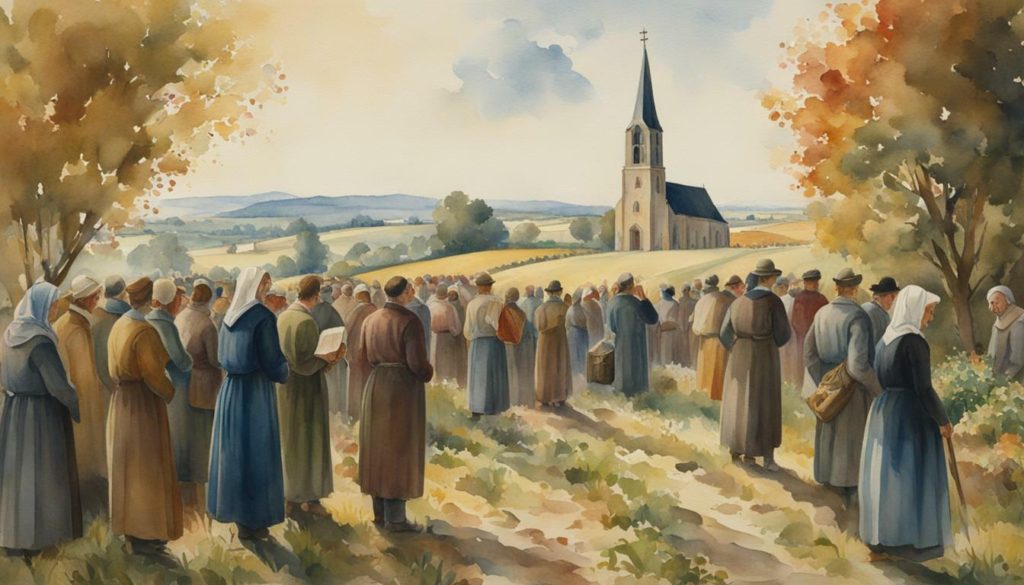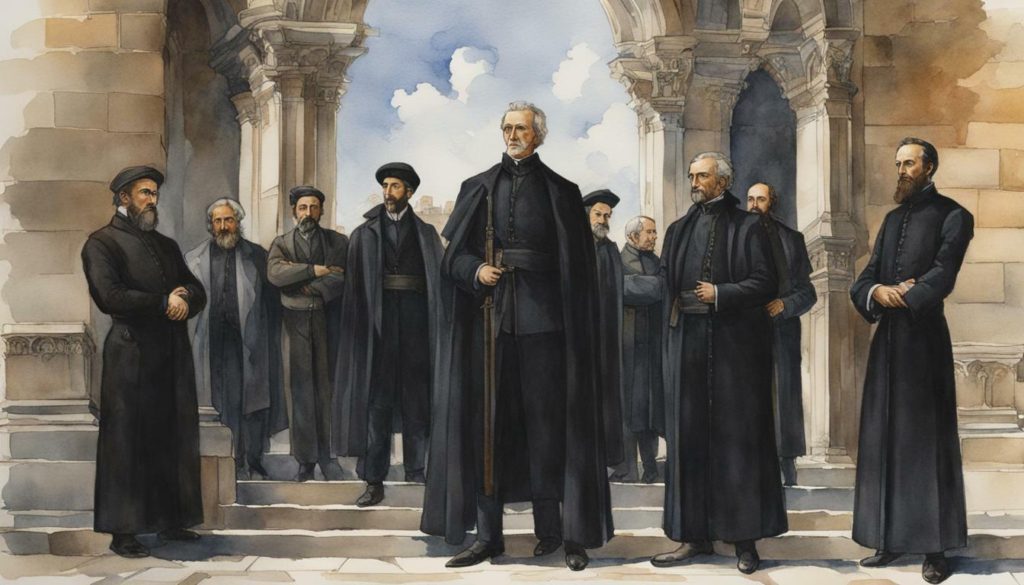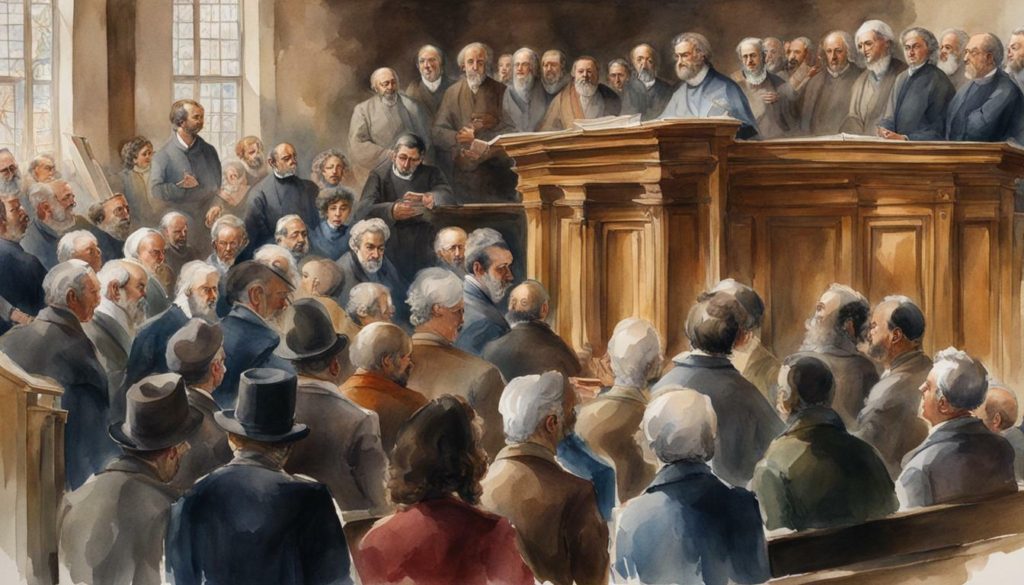Calvinism gained immense popularity for various compelling reasons, attracting individuals across different regions and leaving a lasting impact on religious beliefs. This movement, rooted in the teachings of John Calvin, offered a transformative and God-centered approach to faith and life, making it a powerful force in the Protestant Reformation and beyond.
- Calvinism’s popularity stemmed from its focus on God’s power and authority.
- The movement emphasized the sovereignty of God and the lowliness of man, providing a sense of certainty and stability.
- Calvinists placed a strong emphasis on scripture and deep study, as well as a passion for the greatness of God.
- Control was believed to rest in God’s hands, which was seen by followers as liberating.
- Worship in Calvinism was centered solely on God, not on man.
The Rise of Calvinism
To understand why Calvinism became so popular, it is essential to delve into its historical origins and the circumstances that led to its rise. Calvinism, a Protestant theological system, emerged in the 16th century during the period of the Protestant Reformation. It was founded by John Calvin, a French theologian, and reformer, who expounded upon the ideas of Martin Luther and other reformers.
Calvin’s teachings gained significant traction in Europe, particularly in Switzerland and the Netherlands, where they were embraced by influential leaders and intellectuals. The rise of Calvinism can be attributed to several factors, including its intellectual rigor, emphasis on God’s sovereignty, and the appeal of its complete theological framework.
“Institutes of the Christian Religion,” written by Calvin, served as a comprehensive guide to Calvinist beliefs and became a seminal work that influenced generations to come.
The Geneva Academy, founded by Calvin in 1559, played a pivotal role in promoting Calvinism. The academy became an intellectual hub, attracting students from across Europe who were inspired by Calvin’s teachings. Many of these students went on to become influential Calvinist leaders, spreading the popularity of Calvinism as they returned to their home countries.

The rise of Calvinism can also be attributed to the fervent missionary zeal of its adherents. Calvinists believed in the predestination of souls, leading them to be driven by a sense of purpose to spread their beliefs to the far corners of the world. This missionary zeal contributed to the global reach of Calvinism and its enduring influence in various regions, including North America, where it played a significant role in shaping the religious landscape.
| Reasons for the Rise of Calvinism | Historical Examples |
|---|---|
| Intellectual rigor and complete theological framework | John Calvin’s “Institutes of the Christian Religion” |
| Role of the Geneva Academy in producing influential leaders | John Knox, Theodore Beza, and other Calvinist leaders |
| Missionary zeal and global reach | The spread of Calvinism to North America and other regions |
In conclusion, the rise of Calvinism can be attributed to a combination of factors, including the intellectual appeal of its theological framework, the influence of the Geneva Academy, and the fervent missionary zeal of its adherents. Calvinism gained immense popularity during the Protestant Reformation and continues to exert its influence today, shaping religious beliefs and practices worldwide.
Calvinist Theology and Philosophy
Calvinism offered a unique theological perspective that centered on the sovereignty of God and the lowliness of man, establishing a distinct religious framework. At the core of Calvinist theology was the belief in God’s absolute control over all aspects of life, including salvation. Followers of Calvinism embraced the concept of predestination, which stated that God had already determined who would be saved and who would be damned.
Calvinist religious beliefs emphasized the fallen nature of humanity and the need for divine grace. According to Calvinist doctrine, humans were inherently sinful and incapable of saving themselves. Instead, salvation was entirely a result of God’s grace, which was freely given to those predestined for salvation.
The emphasis on scripture and deep study was another defining aspect of Calvinist theology. Calvinists believed that the Bible was the ultimate authority in matters of faith and practice. They placed great importance on the interpretation of scripture, engaging in meticulous study and analysis to understand God’s will. This commitment to studying the Word of God led to the establishment of numerous Calvinist educational institutions and the development of a scholarly tradition.

“The knowledge of God and of ourselves are connected. Without knowledge of self, there is no knowledge of God. Without knowledge of God, there is no knowledge of self.” – John Calvin
Calvinism’s theological framework resonated with individuals seeking a deep and profound understanding of God’s sovereignty. Its focus on God-centered worship, dedication to scriptural study, and the belief in divine control provided followers with a sense of certainty and stability in an uncertain world.
| Key Aspects of Calvinist Theology | Description |
|---|---|
| Sovereignty of God | Belief in God’s absolute control over all aspects of life. |
| Predestination | Doctrine that states God has already determined who will be saved and who will be damned. |
| Salvation by Grace | Emphasis on the fallen nature of humanity and the need for divine grace for salvation. |
| Authority of Scripture | Recognition of the Bible as the ultimate authority of faith and practice. |
| Deep Study of Scripture | Dedication to meticulous study and interpretation of the Word of God. |
The Impact of Calvinism in Europe
Calvinism made a profound impact on Europe, shaping the religious landscape, political systems, and societal norms of various nations. The influence of this Protestant theology spread rapidly throughout the continent, leaving an indelible mark on European history.
One of the primary effects of Calvinism in Europe was its role in the Reformation movement. Led by influential reformers such as John Calvin, the Calvinist doctrine challenged the authority of the Catholic Church and paved the way for a new era of religious freedom and individual interpretation of scripture. This shift had far-reaching consequences, sparking religious conflicts and reshaping the religious map of Europe.
In addition to its impact on religion, Calvinism also had significant implications for political systems in Europe. The concept of a godly society, where the state and church were closely intertwined, laid the foundation for the emergence of theocracy in nations such as Geneva and Scotland. This fusion of religious and political power shaped the governing structures and policies of these regions, promoting a strict moral code and a sense of divine mandate in governance.
Socially, Calvinism brought about a transformation in European societies. Its emphasis on hard work, discipline, and frugality created a cultural climate that fostered economic growth and innovation. This ethos, known as the “Protestant work ethic,” contributed to the rise of capitalism and the development of the modern industrialized world. Calvinists’ commitment to education also led to the establishment of institutions such as the Geneva Academy, which produced an elite class of Calvinist leaders and intellectuals.
Calvinism’s Impact on Europe Table
| Aspect | Impact |
|---|---|
| Religious Landscape | Challenged Catholic Church, sparked religious conflicts |
| Political Systems | Established theocracy, influenced governance |
| Societal Norms | Promoted the Protestant work ethic, fostered economic growth |
As Calvinism gained momentum and spread across Europe, its impact on the continent became increasingly evident. From religious reform to political and social transformations, this theological movement shaped the course of European history and left an enduring legacy that continues to influence societies to this day.

“Calvinism made a lasting impression on Europe, molding the religious, political, and social fabric of the continent. Its influence in these realms has left an indelible mark on European history.” – Notable Scholar
The Spread of Calvinism to America
Calvinism found fertile ground in America, as early settlers brought their religious beliefs with them, leading to the establishment of Calvinist communities and the shaping of American values. The principles of Calvinism resonated with those seeking a strong sense of religious devotion and a strict moral code. As the colonies grew, so did the influence of Calvinism, impacting everything from politics to education.
In the early years, Calvinist churches served as the center of community life, providing not only spiritual guidance but also social cohesion. The Puritans, in particular, sought to create a society based on their interpretation of Calvinist principles, enforcing strict moral codes and advocating for a disciplined, God-centered life. This emphasis on personal responsibility and moral conduct had a lasting impact on American culture and the development of a strong work ethic.
Education was a cornerstone of Calvinism, and this emphasis on learning translated to the establishment of some of America’s earliest universities. Harvard, founded in 1636, and Princeton, established in 1746, were both originally intended to train ministers in the Calvinist tradition. These institutions played a crucial role in shaping American intellectual life, producing leaders who would go on to influence the nation in various fields. The Geneva Academy in Switzerland, with its strong Calvinist influence, also attracted American students, further spreading Calvinism’s reach.
The Influence of Calvinism on American Politics
Calvinism also had a profound impact on the political landscape of America. The belief in the sovereignty of God and the idea that rulers derive their authority from Him contributed to the development of a strong sense of civic duty and the belief in limited government. The concept of a “covenant” between God and the people, where obedience to God’s law was rewarded with divine favor, served as a foundation for the idea of a social contract between citizens and their rulers.
This Calvinist influence can be seen in seminal documents such as the Mayflower Compact, which established the first form of self-government in the colonies, as well as in the writings of influential figures like John Adams and Jonathan Edwards. The values of liberty, individualism, and religious freedom, which are deeply ingrained in American society, can be traced back to the influence of Calvinism.
| Calvinist Principles in America | Impact |
|---|---|
| Emphasis on personal responsibility and moral conduct | Shaped American culture and work ethic |
| Strong focus on education | Establishment of universities, shaping American intellectual life |
| Belief in the sovereignty of God and limited government | Influence on American political ideals and the concept of civic duty |
| Values of liberty, individualism, and religious freedom | Deeply ingrained in American society |
Calvinism’s impact on America extended far beyond the religious realm, influencing the very fabric of society and shaping the nation’s values. Its principles of personal responsibility, the importance of education, and the belief in limited government left an indelible mark on American culture and continue to resonate today.

The Geneva Academy played a crucial role in educating and training leaders who later became instrumental in promoting Calvinism globally. Founded in 1559 by John Calvin, the Academy was initially established as a seminary to prepare ministers for the Reformed Church. Under Calvin’s leadership, it quickly gained a reputation for its rigorous academic curriculum and commitment to Calvinist principles.
The Academy attracted students from all over Europe who were eager to immerse themselves in the study of Calvinist theology and philosophy. It offered a comprehensive education that included courses in biblical interpretation, systematic theology, and church history. Additionally, students were trained in practical ministry skills and were encouraged to actively engage in the mission of spreading Calvinism.
The Geneva Academy produced a remarkable roster of influential Calvinist leaders who went on to shape the course of the movement. These leaders, armed with a deep understanding of Calvinist doctrine and principles, became ambassadors for Calvinism in their own countries and beyond. They established churches, defended Calvinist beliefs against opponents, and contributed to the spread of Calvinism in Europe and even in the fledgling colonies of America.
| Name | Country | Role |
|---|---|---|
| John Knox | Scotland | Leader of the Scottish Reformation |
| Theodore Beza | France | Successor to John Calvin in Geneva |
| William Ames | England | Influential Puritan theologian |
| Francis Turretin | Switzerland | Renowned Reformed theologian |
These Calvinist leaders not only spread the teachings of Calvinism but also defended its doctrines against rival theological schools and opponents. Through their sermons, writings, and personal influence, they shaped the theological landscape of their respective countries, leaving a lasting impact on religious thought and practice.
Overall, the Geneva Academy played a pivotal role in producing educated and passionate leaders who were committed to advancing the cause of Calvinism. Their knowledge and zeal, combined with the comprehensive theological framework provided by Calvinism, enabled the movement to gain a foothold in Europe and beyond, leaving an enduring legacy that still resonates today.

The all-encompassing nature of Calvinism, addressing various aspects of life and faith, contributed to its strong appeal and popularity. This comprehensive theological framework provided believers with a sense of clarity and purpose, offering a complete worldview that left no aspect of life untouched by the influence of God’s sovereignty.
Calvinism offered a unique approach that placed God at the center of everything. It emphasized the greatness and authority of God, highlighting His power and control over all things. This perspective appealed to many individuals seeking a firm foundation and a sense of certainty in an uncertain world. By recognizing the lowliness of man and the supreme sovereignty of God, Calvinism provided a framework of stability and security that resonated deeply with its followers.
One of the defining features of Calvinism was its strong emphasis on scripture and deep study. Adherents were encouraged to delve into the Bible and engage in rigorous theological inquiry, seeking to understand and apply God’s Word in all areas of life. This commitment to scriptural authority and intellectual exploration fostered a deep appreciation for the richness and depth of God’s truth, further fueling the appeal of Calvinism.
Moreover, Calvinism recognized that control ultimately rested in the hands of God. This belief was seen as liberating, as it relieved individuals of the burden of striving for self-salvation or relying on their own limited abilities. Instead, Calvinists found comfort in trusting in God’s providence and resting in His sovereign plan. This belief in God’s control not only provided a sense of freedom but also helped believers find meaning and purpose in their lives.
The appeal and popularity of Calvinism extended beyond individuals’ personal faith journeys. Calvinistic worship centered solely on glorifying God, emphasizing His greatness and majesty. This approach resonated with those seeking a pure and focused worship experience, free from distractions and human-centered elements.
| Key Factors for the Appeal of Calvinism | Explanation |
|---|---|
| God-centered approach | Calvinism focused solely on the power and authority of God, offering believers a firm foundation. |
| Sense of certainty and stability | Calvinism emphasized the sovereignty of God and provided believers with a sense of security. |
| Emphasis on scripture and deep study | Calvinism encouraged believers to engage in rigorous theological inquiry and study God’s Word. |
| Belief in God’s control | The recognition of God’s control in Calvinism was seen as liberating and provided believers with a sense of purpose. |
| Worship centered on God | Calvinistic worship focused solely on glorifying God, offering a pure and focused worship experience. |

Calvinism’s emphasis on God’s sovereignty and predestination offered a reassuring sense of certainty and stability in an uncertain world. Followers of Calvinism found solace in the belief that every aspect of their lives was under the control of a loving and all-powerful God. This belief provided them with a solid foundation and a clear understanding of their place in the world.
One of the key tenets of Calvinism is the concept of predestination, which states that God has already chosen who will be saved and who will be damned. This belief in an unchangeable divine plan gave Calvinists a sense of security, knowing that their eternal destiny was predetermined. It provided them with a comforting assurance that they were part of God’s chosen people and that their salvation was secure.
In addition to the doctrine of predestination, Calvinism also emphasized the total depravity of human nature. This belief acknowledged the fallen state of humanity and the sinfulness inherent in every individual. By recognizing their own unworthiness, Calvinists found comfort and stability in surrendering themselves completely to God’s will. This humble submission to God’s sovereignty allowed them to find peace in the knowledge that their lives were being guided by a higher power.
Furthermore, Calvinism placed a strong emphasis on the authority of Scripture and the need for deep study. The careful examination of biblical texts and the rigorous pursuit of theological understanding provided Calvinists with intellectual stimulation and a sense of purpose. This dedication to studying the Word of God not only deepened their faith but also reinforced their certainty in the truth of Calvinistic beliefs.
| Factors for Certainty and Stability in Calvinism |
|---|
| Emphasis on God’s sovereignty and predestination |
| Belief in the total depravity of human nature |
| Commitment to the authority of Scripture and deep study |
“In Calvinism, we find a philosophy that provides answers to life’s most profound questions and offers a solid foundation upon which to build one’s faith. It is through embracing the certainty and stability of Calvinistic beliefs that individuals are able to find true peace and fulfillment.”
By embracing Calvinism’s emphasis on certainty and stability, its followers were able to navigate the challenges and uncertainties of life with confidence. The belief in God’s control over all things, the recognition of human sinfulness, and the commitment to deep study and scriptural authority all contributed to the enduring appeal of Calvinistic beliefs. This comprehensive theological framework not only provided reassurance to its adherents but also played a significant role in shaping the course of history, as Calvinism’s influence spread far beyond Europe to impact societies across the globe.

Calvinism placed a significant emphasis on scripture and encouraged its followers to engage in deep study and interpretation of the Word of God. This commitment to scripture was a key aspect of Calvinist theology and played a crucial role in shaping the beliefs and practices of its adherents.
In Calvinist communities, the Bible was revered as the ultimate authority on matters of faith and life. The words of scripture were seen as divinely inspired and infallible, providing a foundation for all aspects of belief and practice. As a result, Calvinists sought to immerse themselves in the study and understanding of scripture, delving into its depths to uncover its teachings and insights.
This emphasis on deep study led to the development of rigorous theological education and scholarship within Calvinism. The Geneva Academy, established by John Calvin in 1559, became a renowned center of learning where aspiring pastors and theologians received comprehensive instruction in biblical interpretation and theology. The Academy’s curriculum emphasized the careful examination of scripture, enabling students to develop a profound understanding of its teachings.
Table: Key Aspects of Calvinist Study
| Aspect | Description |
|---|---|
| Exegesis | The process of analyzing and interpreting biblical texts to uncover their original meaning and intent. |
| Hermeneutics | The principles and methods used for interpreting scripture, taking into account its cultural and historical context. |
| Systematic Theology | The study of various doctrines and themes found in scripture, organizing them into a coherent theological framework. |
| Apologetics | The defense of Christian beliefs against objections and criticisms, using reason and evidence to support the faith. |
“The study of scripture is a sacred duty for every believer,” wrote John Calvin in his Institutes of the Christian Religion. “Through its teachings, we come to know the character and will of God, and find guidance for our lives.”
This commitment to scripture and deep study continues to be a defining characteristic of Calvinism. Calvinist congregations and theological institutions around the world prioritize the exploration and interpretation of the Bible, equipping their members with a rich understanding of Christian doctrine and values.

Calvinism’s acknowledgment of God’s complete control over all things provided a sense of freedom and liberation, relieving individuals from the burden of trying to control their own destinies. This belief in divine sovereignty permeated every aspect of Calvinist theology and philosophy, shaping the worldview of its followers.
At the heart of Calvinism is the understanding that God is in control of all events in the world, from the grandest to the most minute. This belief was not seen as restrictive, but rather as a source of comfort and assurance. It allowed individuals to trust in God’s plan and accept that everything happens according to His divine will. Instead of feeling powerless, Calvinists found solace in knowing that their lives were guided by a loving and omnipotent God.
In the words of John Calvin himself, “We should seek God’s will in all things, and not rely on our own limited understanding.” This perspective encouraged Calvinists to surrender their own desires and ambitions to God, trusting in His providence and wisdom. It freed them from the anxiety and pressure of constantly trying to manipulate their circumstances, and instead allowed them to focus on living a life that honored and glorified God.
| Calvinist Beliefs | Liberting Aspect |
|---|---|
| Divine Sovereignty | Relief from the burden of control |
| Trust in God’s Plan | Freedom to surrender personal ambitions |
| Submission to God’s Will | Release from anxiety and pressure |
“Calvinism teaches us that God’s control is not a limitation, but a source of freedom. It allows us to let go of our own striving and find peace in trusting in His perfect plan.” – A Calvinist believer
This liberating aspect of Calvinism not only provided comfort and assurance to its followers but also had practical implications in their daily lives. It fostered a sense of humility, as individuals recognized their own limitations and acknowledged God’s infinite wisdom. It also encouraged a spirit of gratitude and contentment, as Calvinists found joy in the blessings that came their way, knowing that they were gifts from a loving God.
Ultimately, the liberating aspect of God’s control in Calvinism allowed individuals to live with a sense of purpose and meaning, knowing that their lives were part of a divine plan. It offered a profound sense of freedom, freeing them from the constraints of their own limited understanding and empowering them to live a life dedicated to the glory of God.

Worship in Calvinism was centered on God, emphasizing his greatness and majesty rather than individual desires or needs. This distinctive approach to worship reflected the fundamental beliefs of Calvinism, which placed God at the center of every aspect of life. In the words of John Calvin himself, “All true wisdom consists in two things: knowledge of God and knowledge of ourselves.”
Calvinistic worship was characterized by a deep sense of reverence and awe for God. It sought to exalt and glorify Him through prayers, hymns, and the preaching of His Word. The focus was not on personal fulfillment or entertainment, but on offering sincere adoration to the Almighty. As Calvin wrote, “In sincere worship, we ought to be stripped of all selfish affections and desires, and to seek only what pleases God.”
The Calvinist understanding of worship was rooted in the belief that God is all-powerful and sovereign. It acknowledged that He alone deserves praise and honor, and that human beings are called to submit to His will. This perspective shaped the songs, prayers, and liturgical practices of the Calvinist tradition. It also led to a rejection of any forms of worship that exalted human beings or distracted from the glory of God.
“In sincere worship, we ought to be stripped of all selfish affections and desires, and to seek only what pleases God.” – John Calvin
Throughout history, Calvinistic worship has inspired a deep devotion to God and a sense of awe in His presence. Its impact can still be felt in churches and religious communities around the world today. By placing worship at the heart of their faith, Calvinists have sought to honor and glorify God in every aspect of their lives.

| Key elements of Calvinistic Worship | Examples |
|---|---|
| Exalting God’s attributes | The singing of hymns that praise God’s power, wisdom, and love. |
| Preaching God’s Word | The sermon as the centerpiece of the worship service, focusing on biblical teachings. |
| Corporate prayer | Gathered prayers that express submission to God and seek His guidance and blessing. |
| Scripture reading | The reading of Bible passages to emphasize God’s authority and the importance of His Word. |
Missionary Zeal and Calvinism’s Global Reach
Calvinism’s missionary zeal and commitment to spreading its theological convictions led to its widespread adoption and popularity in various regions around the world. The influence of Calvinism extended far beyond its birthplace in Switzerland and had a profound impact on the development of Protestantism in Europe, America, and beyond.
One of the key factors contributing to the global reach of Calvinism was its complete theological framework. Calvinists believed in a God-centered worldview, placing God’s power and authority at the forefront of their beliefs. This comprehensive theology provided a strong foundation for evangelism and missionary work, as Calvinists passionately shared their convictions with others.
The presence of the Geneva Academy, a renowned educational institution founded by John Calvin, played a crucial role in the global spread of Calvinism. The academy produced many skilled and influential Calvinist leaders who carried the message of Calvinism to different parts of the world. These leaders, equipped with a deep understanding of Calvinist theology and philosophy, played a significant role in popularizing Calvinism and establishing Calvinist communities in new territories.
| Calvinist Contributions to Global Christianity | Key Figures |
|---|---|
| Establishment of Reformed Churches in Europe and America | John Calvin, Theodore Beza |
| Spread of Calvinism to the Dutch East Indies (Indonesia) | Jakobus Zeeus, Peter Candidius |
| Missionary Work in South Africa | Jean le Sueur, Francois Villion |
| Influence on English Puritanism and the Pilgrims | William Perkins, John Robinson |
Calvinism’s global reach was also facilitated by the missionary zeal of its followers. Calvinists were driven by a desire to bring the transformative power of their faith to people of all nations. They engaged in extensive missionary activities, establishing churches, schools, and medical missions in various regions. Through their selfless service and passionate evangelism, Calvinists left an indelible mark on the religious landscape of different countries.
Today, the enduring appeal and influence of Calvinism can still be seen in the vibrant communities of Calvinist believers around the world. The theological depth, missionary zeal, and commitment to God-centered worship have contributed to the longevity and global reach of Calvinism, making it a significant force within Christianity.

Calvinism’s enduring appeal lies in its firm theological grounding, emphasis on God’s sovereignty, and its ability to provide answers to profound existential questions. The movement, which gained popularity during the 16th century Protestant Reformation, offered a comprehensive theological framework that resonated with individuals seeking a structured and meaningful understanding of their faith.
One of the key factors that contributed to the enduring appeal of Calvinism was its unwavering focus on God’s sovereignty. Calvinists believed that God held complete control over all aspects of existence, including the salvation of individuals. This provided a sense of certainty and stability in a time of religious and political upheaval. By emphasizing God’s control, Calvinism offered a framework for understanding the complexities of life and finding solace in the understanding that everything happened according to God’s divine plan.
Furthermore, Calvinism placed a strong emphasis on scripture and deep study. The movement encouraged its followers to engage in rigorous study of the Bible, seeking to understand and apply its teachings to every aspect of life. This commitment to scripture and intellectual exploration fostered a sense of awe and reverence for the greatness of God, contributing to the enduring appeal of Calvinism.
In addition, the prioritization of worship centered solely on God set Calvinism apart from other theological perspectives. Calvinists believed that worship should be focused on glorifying God, rather than fulfilling human desires or seeking personal fulfillment. This approach to worship resonated with individuals who sought a deeper connection with the divine and a sense of purpose rooted in their relationship with God.
| Key Factors of Calvinism’s Enduring Appeal |
|---|
| Firm theological grounding and comprehensive framework |
| Emphasis on God’s sovereignty and divine control |
| Commitment to scripture and deep study |
| Focus on worship centered solely on God |
Calvinism’s enduring appeal extended beyond its theological aspects. The movement’s complete theology, combined with its missionary zeal, led to its global reach and influence. Calvinists were driven by a sense of mission and sought to spread their beliefs to all corners of the world. Additionally, the establishment of the Geneva Academy played a crucial role in producing influential Calvinist leaders who further propagated the popularity of Calvinism.
In conclusion, Calvinism’s enduring appeal and influence can be attributed to its firm theological grounding, emphasis on God’s sovereignty, and its ability to provide answers to profound existential questions. By offering a comprehensive framework for understanding faith, Calvinism has continued to resonate with individuals seeking a deep and meaningful connection with the divine.

Calvinism played a pivotal role in the larger context of the Protestant Reformation, contributing to the theological debates and shaping the course of religious history. As the Reformation swept across Europe in the 16th century, challenging the authority of the Catholic Church and advocating for religious reform, Calvinism emerged as a distinct branch of Protestantism. Led by the influential theologian John Calvin, Calvinism offered a comprehensive theological framework that attracted a wide following.
One of the key contributions of Calvinism to the Reformation was its emphasis on the sovereignty of God and the concept of predestination. Calvin taught that God’s divine power and authority were absolute, and that the destiny of every individual was predetermined by God’s will. This theological stance sparked intense debates among reformers, with some embracing Calvin’s ideas and others vehemently opposing them.
Calvinism also brought about significant changes to the structure of the church and the role of religious leaders. The movement emphasized the importance of a disciplined and virtuous life and sought to create a community that adhered strictly to biblical principles. This led to the establishment of churches governed by a system of elders, with strong leadership and a focus on moral conduct.
| Calvinistic Beliefs | Reformation Impact |
|---|---|
| Emphasized the sovereignty of God | Challenged the authority of the Catholic Church |
| Predestination and divine control | Ignited theological debates and discussions |
| Established disciplined and virtuous communities | Transformed the structure of the church |
“Calvinism offered a radical vision for religious reform, centering everything around the supreme authority and power of God. Its influence on the Protestant Reformation cannot be overstated.”
The impact of Calvinism extended beyond theological debates and had far-reaching consequences for European society. Calvinist ideas played a significant role in shaping legal systems, education, and even economic practices. The Protestant work ethic, which emphasized frugality, industry, and personal responsibility, was widely embraced by Calvinists and had a profound impact on the development of capitalism.
In conclusion, Calvinism’s distinctive beliefs and practices had a profound impact on the Protestant Reformation and the course of religious history. Its emphasis on the sovereignty of God, predestination, and disciplined living sparked theological debates and shaped the structure of the church. The influence of Calvinism extended beyond religious spheres, permeating European society and leaving an indelible mark on legal, educational, and economic systems. Calvinism continues to be influential to this day, its enduring appeal rooted in its comprehensive theology and fervent missionary zeal.

In conclusion, Calvinism’s popularity can be attributed to its God-centered approach, emphasis on certainty and stability, comprehensive theology, and its far-reaching influence across different regions and historical periods.
Calvinism offered a fresh perspective by placing God at the center of everything. Its followers believed that the true purpose of life was to glorify God and acknowledge His power and authority in every aspect. This focus on God’s sovereignty provided a sense of certainty and stability in an unpredictable world, assuring believers that everything was under God’s control.
The appeal of Calvinism was further heightened by its comprehensive theology. Emphasizing deep study of scripture, Calvinists sought to understand and apply God’s word in their lives. This commitment to studying the Bible allowed for a deeper understanding of God’s character and His plan for salvation.
Moreover, Calvinism’s influence extended beyond individual religious practices. The movement’s teachings encompassed various aspects of life, including governance, economics, and social structures. The presence of the Geneva Academy played a crucial role in spreading the popularity of Calvinism, as it produced numerous influential Calvinist leaders who championed its principles and helped establish Calvinism as a dominant force in Europe and beyond.
FAQ
Q: What were the main reasons for the popularity of Calvinism?
A: Calvinism offered a God-centered approach, emphasized the sovereignty of God, and provided certainty and stability. It also prioritized scripture and deep study, recognized God’s control as liberating, and focused worship solely on God.
Q: What factors contributed to the international spread of Calvinism?
A: Calvinism’s complete theology, missionary zeal, and the presence of the Geneva Academy, which produced many Calvinist leaders, all played a role in its international spread.
Q: How did Calvinism impact European societies and cultures?
A: Calvinism had a significant influence on European societies, shaping their religious beliefs, moral values, and social structures.
Q: How did Calvinism take root in America?
A: Calvinism was brought to America by early settlers and played a crucial role in shaping the religious landscape and the development of the country.
Q: What was the role of the Geneva Academy in Calvinism’s popularity?
A: The Geneva Academy produced many influential Calvinist leaders who spread the teachings of Calvinism and contributed to its popularity.
Q: What made Calvinism’s theological framework appealing to its followers?
A: Calvinism’s comprehensive theology, which focused on God’s power and authority, resonated with individuals seeking a complete understanding of their faith.
Q: How did Calvinism provide a sense of certainty and stability?
A: Calvinism emphasized the lowliness of man and the sovereignty of God, providing a firm belief system that offered certainty and stability to its adherents.
Q: Why was scripture and deep study important in Calvinism?
A: Calvinism placed a strong emphasis on scripture as the ultimate authority and encouraged deep study to understand and apply its teachings.
Q: How did the belief in God’s control in Calvinism become liberating?
A: Calvinism recognized that control rests in God’s hands, which was seen as liberating by its followers, relieving them from the burden of trying to control their own lives.
Q: How did Calvinism approach worship?
A: Calvinism prioritized worship that was all about God and not about man, focusing solely on glorifying God and his greatness.
Q: How did Calvinism spread globally?
A: Calvinists had a missionary zeal and actively spread their beliefs around the world, leading to the global reach and influence of Calvinism.
Q: Why does Calvinism continue to have enduring appeal and influence?
A: Calvinism’s emphasis on God’s sovereignty and its comprehensive theological framework continue to resonate with individuals seeking a deeply rooted faith.
Q: What role did Calvinism play in the broader Protestant Reformation movement?
A: Calvinism was one of the key branches of the Protestant Reformation, contributing to the reform of religious practices, beliefs, and institutions.
